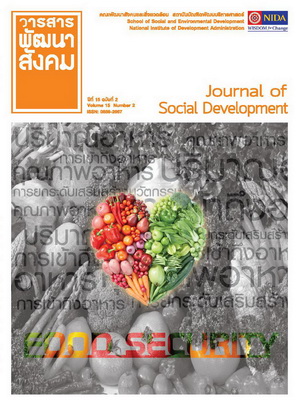การจัดการอาหารในระดับครอบครัว ตามวิถีมุสลิมและกระบวนการขับเคลื่อน เพื่อให้เกิดความมั่นคงทางอาหารในครอบครัว : กรณีศึกษา ชุมชนบ้านชาใจ อำเภอไชโย จังหวัดอ่างทอง
Main Article Content
Abstract
บทคัดย่อ
งานวิจัยนี้มีวัตถุประสงค์เพื่อศึกษาวิธีการจัดการอาหารในระดับครอบครัวตามวิถีชาวมุสลิม และเพื่อศึกษากระบวนการขับเคลื่อนเพื่อให้เกิดความมั่นคงทางอาหารในครอบครัว รวมถึงศึกษาวิธีการปรับตัวของครอบครัวมุสลิมในการจัดการอาหาร การศึกษาใช้ระเบียบวิธีวิจัยเชิงคุณภาพ ด้วยการศึกษาเอกสาร การสัมภาษณ์เจาะลึกผู้ให้ข้อมูลที่สำคัญ และการสังเกต ข้อมูลที่ได้นำมาวิเคราะห์ตีความตามหลักตรรกะควบคู่กับบริบทใช้สถิติเชิงพรรณนาประกอบ
ผลการศึกษา พบว่า
1. วิธีการจัดการอาหารในระดับครอบครัวตามวิถีมุสลิม แบ่งได้เป็น 3 ลักษณะ คือ
1) การจัดการอาหารเพื่ออาชีพ ได้แก่ การค้าขายอาหารและเนื้อสัตว์ที่เชือดเอง เป็นการผลิตและบริโภคเอง ทำให้เกิดการหมุนเวียนรายได้ในชุมชน เกิดความมั่นคงทางอาหารด้านการเข้าถึงอาหารได้ตลอดเวลา 2) การจัดการอาหารในชีวิตประจำวัน มีความสอดคล้องกับวิธีการจัดการอาหาร ทั้งนี้ต้องมีความเป็น ฮาลาล และความพอเพียง จึงมีความมั่นคงทางอาหารตามวัฒนธรรมการบริโภคของชุมชน 3) การจัดการอาหารในวัฒนธรรมอิสลาม เช่น การเกิด การแต่งงาน การถือศีลอด ล้วนมีอาหารเข้ามาเกี่ยวข้องทั้งสิ้น โดยยึดหลักอาหารทำให้เกิดการแบ่งปันและสร้างสัมพันธ์ในชุมชน สร้างความมั่นคงทางอาหารด้านการเข้าถึงที่สะท้อนในรูปแบบประเพณีวัฒนธรรมอาหาร
2. กระบวนการขับเคลื่อนเพื่อให้เกิดความมั่นคงทางอาหาร เกิดจากความต้องการพื้นที่ในการผลิตอาหาร โดยมีแรงขับเคลื่อนจากคนในชุมชนที่ตระหนักถึงอนาคตของลูกหลานต่อความพอเพียงของอาหาร ซึ่งทุกคนต้องร่วมมือแก้ปัญหา โดยลดความเสี่ยงการขาดแคลนอาหาร ด้วยการปลูกผักลอยฟ้าที่ใช้พื้นที่น้อย ทั้งนี้ภาครัฐและเอกชนต้องให้การสนับสนุนความรู้และเงินทุน
3. วิธีการปรับตัวของครอบครัวมุสลิม คือ การเปลี่ยนพฤติกรรมการกินอย่างประหยัด ด้วยการกินรวมกันเป็นครอบครัว แต่ยังคงเน้นการแบ่งปันอาหารเช่นเดิม ทั้งนี้เป็นผลมาจากหลักคำสอนของศาสนาอิสลามที่ให้กินอย่างพอเพียงและไม่ฟุ่มเฟือย รวมถึงการแบ่งปันกัน
คำสำคัญ : วิธีจัดการอาหารตามวิถีมุสลิม; กระบวนการขับเคลื่อน; วิธีการปรับตัว
ABSTRACT
The objectives of this research are 1) to study food management at the family level according to Muslim Way of life; 2) to study the mobilization process to attain food security in a family; 3) to study methods of adaptation employed by Muslim families in manage food, including recommendations about food mobility to reach security level among people of Ban Cha Jai* community.
It is a qualitative study, collecting data by using the in-depth interview technique with key-informants and observation ; data are analyzed with logical context description in reference to relevant concepts and theories with the help of descriptive statisfies.
Findings of the research are be summarized as follows
1. The Muslim Family’s food management is divided into 3 aspects, i.e.,
1) management for occupation, that is food for sale and animal fresh, produce and consume within the community; people can have food security all the time;
2) daily life food management, getting along with food management principle, i.e., preparation, making choice in buying, cooking, and food preserving, all of these must go along Islamic principles of HA-LAN and sufficient principle leading to food security according to food culture of Ban Cha Jai* community; 3) food management in culture-joining Islam traditions from birth, marriage, death, fasting month, all of these involve food activities, food sharing principles for community good relations among people into food security for the whole community.
2. Mobilization process to attain family food security derived from local food demand, such as growing vegetables, raising fish. Mobilization energy comes from recognition of future generation having sufficient food. People have to find ways to reduce risks by growing own vegetables; local hospitals, schools, and other organizations also join this venture.
3. Methods of adaptation are changing food taking behavior emphasizing economy by eating together for all family members but food sharing among people in community is still practiced.
Recommendations: Youths should participate in the food management process for the benefits of future food security of the community.
Keywords: Food Management to Muslim Way of Life; Mobilization
Process; Adaptation


